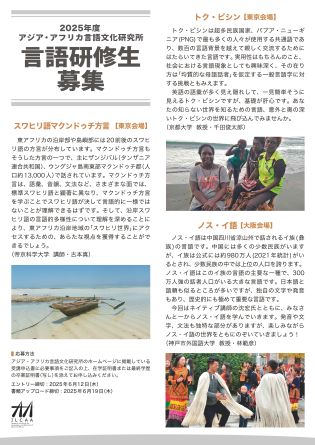ILC 2025

|

|
Application Guidelines for ILCAA Intensive Language Courses 2025
This language training program is part of the educational training activities for researchers conducted by the Research Institute for Languages and Cultures of Asia and Africa (ILCAA). It aims at encouraging the participants to acquire the proficiency of a local language that supports fieldwork, research, and other professional activities in Asia and Africa.
This year, the program has the training courses in Tok Pisin and Makunduchi at ILCAA (venue in Tokyo), and in Nuosu Yi at Minoh Campus, the University of Osaka (venue in Osaka). Please refer to the “Application Guidelines【募集要項】” for the details such as how to apply for the courses. After completing the entry through the entry button and apply for each course by submitting the required documents (①Application form, ②Certificate of Enrollment or Graduation Certificate for the latest educational background (Copy)).
Application Guidelines(Common Guidelines)
| 1. Language |
Tok Pisin, Makunduchi (venue in Tokyo), Nuosu Yi (venue in Osaka) *The date and time may change due to various circumstances. |
|---|---|
| 2. Number of participants | 10 persons per language |
| 3. Application period |
Thursday, May 29 – Thursday, June 19, 2025 *Entry must be completed by June 12, 2025, and all required documents must be uploaded by June 19, 2025. |
| 4. Eligibility | All undergraduate students, graduates, and individuals with necessary academic ability and motivation aligned with the above purpose are eligible. |
| 5. How to Apply |
Please click the entry button below to enter the required information in the entry form. Please submit the following required documents to the URL provided in the auto-reply mail by the due date. Required Documents:
|
| 6. Screening | Participants will be selected through a paper screening conducted by ILCAA. |
| 7. Screening Result | Screening results will be notified to each applicant via email in late July. |
| 8. Enrollment | Those who are admitted to the courses are required to pay the tuition fee for each language in a single payment by the specified due date. For details on tuition fees, please refer to the respective language pages. |
| 9. Certificate of Completion | A certificate of completion will be awarded to the participant who attend at least two-thirds of the designed class hours for each course and achieve sufficient results. |
| 10. Others | During each training period, a cultural lecture will be given by a guest speaker other than the course instructors. The lecture may be open to the public. |
| 11. Class Format | In principle, the courses are offered in person. However, they may change to online courses due to the change of social circumstances. No supplementary classes will be provided in the event of class cancellations due to natural disasters. |
| 12. Contact |
Joint Research Center Section, Research Promotion Division Room 206, 2F, the Research Institute for Languages and Cultures of Asia and Africa 3-11-1 Asahi-cho, Fuchu-shi, Tokyo, 183-8534, Japan TEL 042-330-5603, FAX 042-330-5610 Email: ilcaa-ilc[at]tufs.ac.jp (replace[at] with @) |
*Students of Tokyo University of Foreign Studies, as well as those from partner universities participating in our credit exchange program, are required to attend the class registration guidance session in advance. Please check the details on the official website of Tokyo University of Foreign Studies【東京外国語大学HP】.
**In particular, students from partner universities participating in our credit exchange program must both apply for the credit exchange program at their home university and attend the guidance session.
***Students must pay attention to the application deadline for the credit exchange program. They should also contact the educational affairs division of their home university in advance concerning the application procedures.
Copyright © 2010 Research Institute for Languages and Cultures of Asia and Africa. All Rights Reserved.
